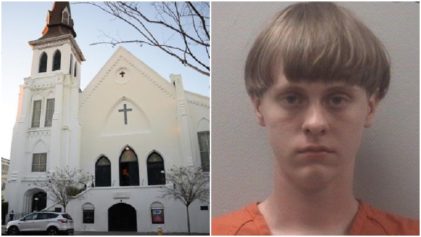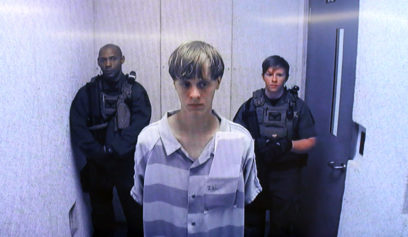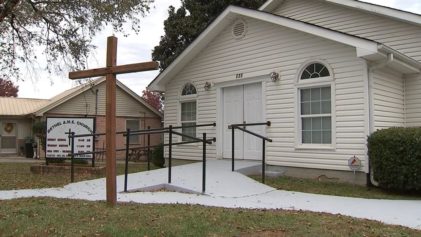James Comey, the Director of the FBI, says he is unsure if the white supremacist attack on the Emanuel AME Church in Charleston, which left nine African-Americans dead, is an act of terrorism. His reluctance to identify white people as terrorists reflects a larger issue of white America’s comfort level with addressing white violence.
“I don’t know yet,” Comey told the The Huffington Post when asked whether the Charleston shooting was an act of terrorism. “I was asked about that a day or so after and said that, based on what I knew at that point, I didn’t see it fitting the definition. Since then, we’ve found the so-called manifesto online, so I know the investigators and prosecutors are looking at it through the lens of hate crime, through the lens, potentially, of terrorism.”
The FBI defines terrorism as “the unlawful use of force or violence against persons or property to intimidate or coerce a government, the civilian population, or any segment thereof in furtherance of political or social objectives.”
Dylann Roof, 21, was charged with the murders of the Bible study group. In his online manifesto, Roof, a neo-Confederate sympathizer who was inspired by hate groups such as the Council of Conservative Citizens, said, “I am not in the position to, alone, go into the ghetto and fight.” He added, “I chose Charleston because it is most historic city in my state, and at one time had the highest ratio of blacks to Whites in the country. We have no skinheads, no real KKK, no one doing anything but talking on the internet. Well someone has to have the bravery to take it to the real world, and I guess that has to be me.”
The white supremacist also said he wanted to “protect the White race” and had “no choice” but to kill innocent worshipers.
How Comey responds to this crime at this crucial point in time could impact how future acts of domestic terrorism are handled, setting the tone for things to come. And when it comes to acts of terror and racial violence, the FBI’s hands are not clean. Although the FBI infiltrated and went after the Klan in the 1960s, it also waged a war on Black America. Through his COINTELPRO program, J. Edgar Hoover disrupted and destroyed civil rights organizations and Black liberation groups, and had his hands in the assassination of Black leaders in order to “prevent the rise of ‘RISE OF A “MESSIAH’ who could unify, and electrify, the militant black nationalist movement.”
Comey seems to understand this troubling history of the Black community and law enforcement, and the “hard truths” of racism in policing.
“There is a reason that I require all new agents and analysts to study the FBI’s interaction with Dr. Martin Luther King, Jr., and to visit his memorial in Washington as part of their training,” Comey said during a speech at Georgetown University on February, 2015. “And there is a reason I keep on my desk a copy of Attorney General Robert Kennedy’s approval of J. Edgar Hoover’s request to wiretap Dr. King.”
Comey has also spoken about racism in policing.
“Much research points to the widespread existence of unconscious bias,” he said. “Many people in our white-majority culture have unconscious racial biases and react differently to a white face than a Black face. In fact, we all, white and lack, carry various biases around with us.”
In light of what Comey has said in the past on racism in policing, it is even more troubling, though understandable, that he refuses to call the Charleston massacre an act of terrorism.
As Musa al-Gharbi pointed out in Al Jazeera America, a New America Foundation report found that American right-wing extremists have killed twice as many Americans as so called Islamic “jihadists” since 9/11. Though Islamic terrorists have been responsible for only 35 percent of the terrorism-related casualties, they account for 60 percent of the indictments.
“Politically, it is nearly impossible to target these groups, because of the protection they receive from Republican lawmakers and lobbyists. And disparities in media coverage have tended to minimize the threat from right-wing terrorists (at times even presenting a sympathetic view of them) while greatly exaggerating the threat from Islamic extremists, removing ethnic nationalists and separatists from public scrutiny as well,” he said. “Right-wing extremists are thus given ample breathing room to spread their ideology and to plan and carry out their attacks, which helps explain both the higher relative lethality of right-wing attacks and the significantly lower rate of indictment for their perpetrators.”
Further, as Timothy McGrath noted in the Los Angeles Daily News, when the GlobalPost published an article called “White Americans are the biggest terror threat in the United States,” it angered many readers.
“Some of them objected to our decision to call the terrorists ‘white Americans’ instead of ‘some white Americans’ or ‘white American extremists,'” he said. “Without qualifying the term, they argued, we were claiming that ALL white Americans were a terror threat. Other readers worried that the headline, though correct, was unnecessarily divisive. Some thought it was unfair to focus on racial data when the study’s summary didn’t call attention to it.”
Who is labeled a ‘terrorist’ is a political decision informed by race and the values and priorities in society. In the U.S., Black and Brown people are the terrorists, the thugs and the gangbangers, but white people are not. Hence, there is no sense of urgency when whites commit atrocities. As Fariza Patel wrote in Just Security, how society describes violence is crucial.
“Calling an act of violence ‘terrorism’ signifies that it is part of a broader pattern that requires attention beyond ordinary crime fighting. Calling Roof’s actions murder rather than terrorism underplays the role of his evident racist motives and avoids questions about the prevalence of racism in our society.”
If America wants to fight terrorism, it needs to identify white supremacist violence as part of the problem. At this point, neither the FBI chief nor white Americans in general are willing to do that.


